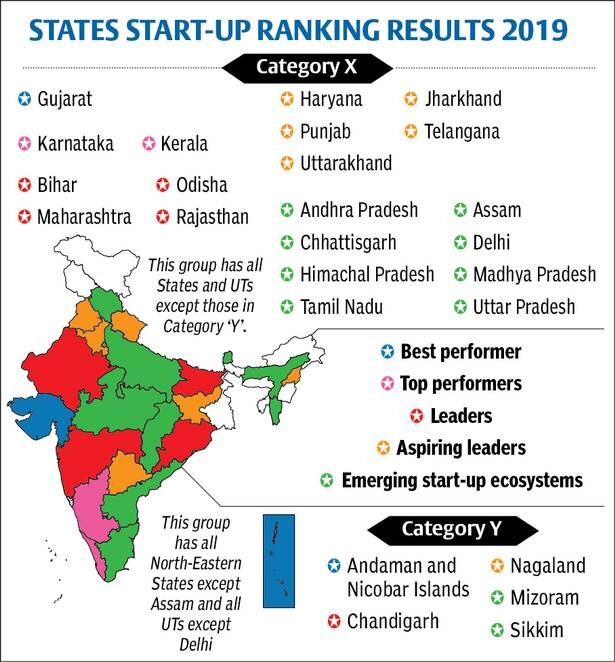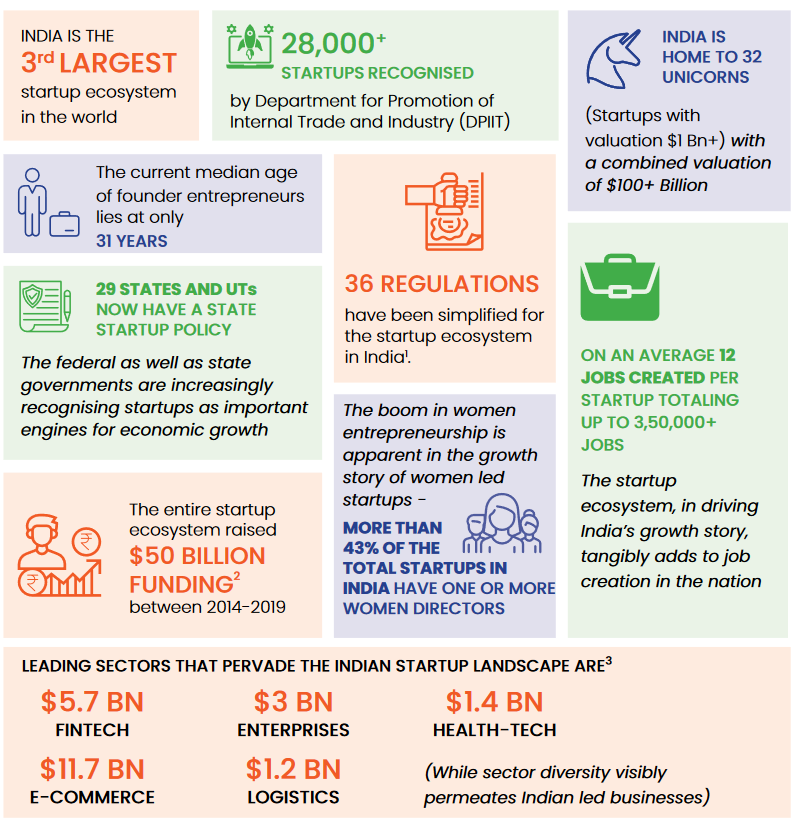Ranking of States on Support to Startup Ecosystems: DPIIT | 12 Sep 2020
Why in News
The Results of the 2nd edition of Ranking of States on Support to Startup Ecosystems were released by the Department for Promotion of Industry and Internal Trade (Ministry of Commerce & Industry).
- DPIIT has recently released the Ease of Doing Business Rankings of the States-2019 based on the State Business Reform Action Plan.
Key Points
- Objectives: The rankings were started with an objective of fostering competitiveness, mutual learning and propel States and Union Territories (UTs) to work proactively towards uplifting the startup ecosystem.
- Framework: The 2019 Ranking Framework has seven broad reform areas consisting of 30 action points ranging from institutional support, easing compliances, relaxation in public procurement norms, incubation support, seed funding support, venture funding support, and awareness and outreach.
- Participation: 22 States and 3 Union Territories.
- 2 Categories: To establish uniformity and ensure standardization in the ranking process, States and UTs have been divided into two groups.
- Category Y: All UTs except Delhi and all States in North East India except Assam.
- Category X: All other States and UT of Delhi.
- Results: The States and UTs were classified as: Best Performers, Top Performers, Leaders, Aspiring Leaders and Emerging Startup Ecosystems.
- Gujarat was the Best performer in Category X followed by Karnata and Kerala. Uttar Pradesh and Tamil Nadu occupied the lowest positions.
- Andaman and Nicobar Islands was the Best performer in Category Y. Sikkim secured the bottom place.
- Gujarat had secured the Best Performer position previous year as well.
Startup Landscape in India
- Government Initiatives:
- Start Up India Fund: Under the Startup India program, the Government created the 'Fund of Funds for Startups (FFS) with a corpus of INR 10,000 crore.
- Policy Reforms for Startups: These include requirement of distributable profits for three years for a company to be eligible to issue shares with differential voting rights.
- Start-up Cells: The Cell will work towards redressal of grievances & tax-related issues of Startups with respect to the administration of the Income-tax Act, 1961.
- National Startup Advisory Council: To advise the Centre on measures needed to build a strong ecosystem for nurturing innovation and start-ups in the country.
- Aatmanirbhar Bharat ARISE-Atal New India Challenge: It is a national initiative to promote research & innovation and increase competitiveness of Indian startups and Micro, Small and Medium Enterprises (MSMEs).
- AIM-iCREST: It is an Incubator Capabilities Enhancement program launched by NITI Aayog for a Robust Ecosystem focused on creating high performing Startups.
- More than 1300 Startups have been supported by seed funding from State Governments. In addition to seed funding, 10 States have created Venture Funds or a Fund of funds and 218 startups have been provided with venture funding support.
- Seed funding : It is the initial capital used when starting a business.
- Venture Funds: This generally comes after the seed funding round. It is a means of equity financing for rapidly-growing private companies for expansion or purchase of a company. It is provided by venture capitalists after carefully scrutinizing the projects.
Way Forward
- The initiative will help in capacity-building of States and building a robust Start-up ecosystem in the country for nurturing innovation and providing opportunities to budding entrepreneurs, as envisaged by the Start-up India Initiative launched in 2016. This is necessary for the country to realize the dream of becoming a 5 trillion dollar economy by 2024.
- There is a need to ease the access to funding to Start-ups, especially those from small cities and the need for simplification of regulations. The central and state governments would have to invest heavily in Research & Development and upcoming technologies, to build further on their competitive value addition to this exercise.


